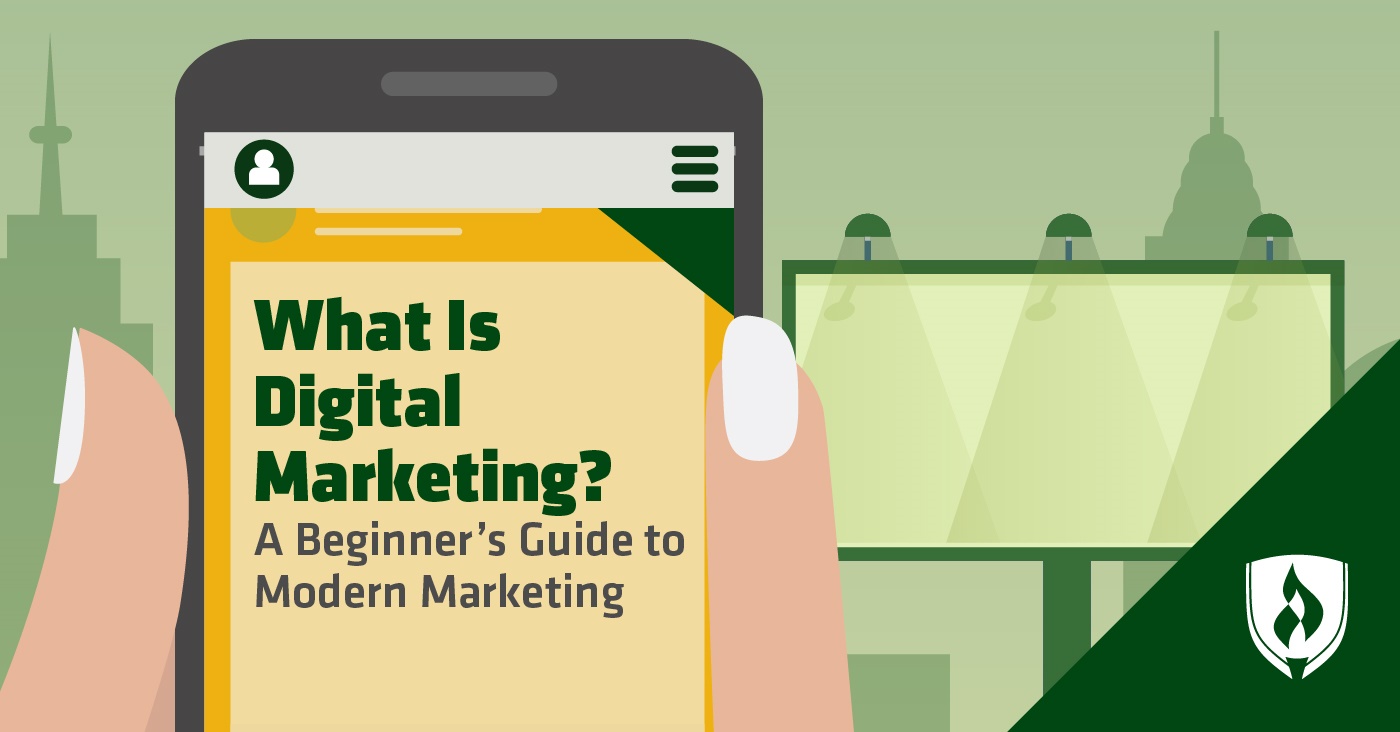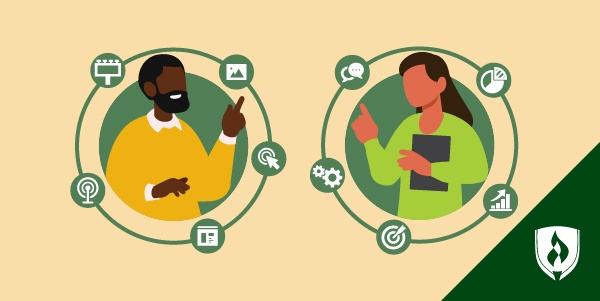
You’ve probably had the experience of seeing just the right ad at just the right time, when the internet mysteriously shows you the perfect product to solve a problem in your life. It might seem like magic, but the truth is that it’s thanks to the hard work of digital marketers.
What is digital marketing? In short, this business career uses modern technology to connect their target audience with the products and services they need.
But you want to know a bit more than that if you’re considering a career in digital marketing. What does a digital marketer do—really? Join us as we hear all about this career from experienced marketing professionals, including digital marketing examples and everything you need to know about digital marketing vs. traditional marketing.
What is digital marketing?
Before you can understand digital marketing, you need a baseline knowledge of marketing itself. According to the American Marketing Association (AMA), marketing has to do with the activities and processes that create, communicate or deliver offerings that have value for clients or customers.
Digital marketing professional John Cho, explains it in simpler terms. “Marketing is bringing brand awareness to your desired audience. Digital marketing simply means any marketing that is done online, but the goal is the same—to connect with your audience.”
Don’t worry if that sounds complicated. Digital marketing is a big field, with plenty of subsets and specialties to help connect a brand with the target audience it serves. Branding, content marketing, targeted ads, search engine optimization and market research are all part of a strong digital marketing plan.
Digital marketing vs. traditional marketing
Traditional and digital marketing share the goal of connecting with a specific audience to raise awareness of a product or service. The biggest difference between the two is the tools they use to accomplish this goal.
Traditional marketing relies on, well, traditional modes of communication. Think billboards, direct mail flyers, telemarketing calls and ads on radio or television. While all of these forms of traditional marketing still exist, modern technology has expanded the possibilities for connecting with an audience.
Digital marketing takes place online, using tools like email, social media, search engines and online ads to communicate with their audience. “Unlike traditional marketing strategies, digital marketing is centered around the internet rather than physical or even real-time communication,” says Rebekah Edwards, co-founder of Content Creators Agency, LLC.
The result is a marketing machine that’s more versatile and potentially less expensive than the tactics of traditional marketing.
Why is digital marketing so effective?
Traditional marketing often interrupts its audience, sometimes with an offer, product or service they don’t even need. Think about how annoying it would be to get a telemarketing call during dinner, or how easy it is to tune out from a TV commercial for diapers if you don’t have kids.
Digital marketing solves that problem by bringing offerings directly to the consumers who actually need them. “Digital marketing can allow a brand to literally become an integral part of your customer's daily life and feel far less like an interruption,” Edwards says.
Thanks to data collection, companies are able to predict what you might be in the market for, from a new apartment to affordable workout gear. “The goal of a digital marketer is to create that seamless experience,” says Quillbot marketing specialist Kaivan Dave. “This saves the user time and also keeps them from seeing ads that aren't relevant to them.”
That data, paired with the many platforms of the online world, gives digital marketing another edge: the ability to meet their exact audience right where they are. “Digital marketers can say, ‘I want to target 18-24 year olds on YouTube,’ set up a campaign, and see results nearly instantly! There isn't that level of control on traditional marketing mediums,” Dave says.
What digital marketing jobs are out there?
Most digital marketers specialize in one area of the field. There’s a wide variety of digital marketing job titles, all utilizing different skillsets and talents. If you’re interested in digital marketing, there’s a place for you and your interests.
“Anyone can become a digital marketer, not because it’s easy but because it’s such a diverse field,” Cho says. “Some jobs are more data based, some are more creative, some are more social.”
This is just a small sample of the digital marketing careers available to you. Take a look at these brief job descriptions to see if any of them are a good fit for your interests and skills.
SEO specialist
Search engine optimization, more commonly known as SEO, is the behind-the-scenes work that connects you with just what you’re looking for when you use a search engine. This area of digital marketing increases a brand’s visibility by helping their website appear to users for relevant search terms. As search engine algorithms grow more complex, this role is becoming more technical and data-driven, according to Edwards.
Social media marketer
Social media marketers manage a brand’s presence across various platforms, including interacting with followers and responding to complaints or questions. Social media managers may also be responsible for the development of targeted ads that raise awareness of their brand to users who may not follow them yet.
Graphic designer
Strong visuals are a key part of digital marketing. Creative graphic designers are needed to create eye-catching images for videos, infographics, blog posts and social media posts. Some designers even create and oversee entire visual brand strategies.
Videographer
Videos that inform and entertain are a key aspect of many digital marketing plans. Video teams can include many roles, like producers, video editors, scriptwriters and videographers. Videographers bring together the creative eye of capturing a professional, on-brand video with the technical skills required to make it happen.
Content marketer
Digital content comes in many forms, such as blog posts, infographics, videos, social media posts and podcasts. Content marketers are the creative minds behind all of these forms of media. They create content that fits their organization’s brand, meets SEO best practices and appeals to their audience.
Paid digital advertising specialist
Paid digital advertising specialists are the pros behind those targeted ads that find you right when you need them. They use data to make smart decisions about creating and targeting ads to the perfect audience—and staying on budget in the process. While they’re certainly a big part of the puzzle, digital ads aren’t limited to social media. You may also encounter the work of these digital marketers while streaming music, watching YouTube videos or searching for more information on a topic.
Is a career in digital marketing in your future?
So, what does a digital marketer do? Simply put, they use technology to execute marketing strategies—often with tactics that are much more measurable and precise than what you’d find with traditional mediums.
If you’re ready to find your place in the world of digital marketing, the right education can help you get there. Learn how to get started by checking out the Rasmussen University Marketing degree programs.




